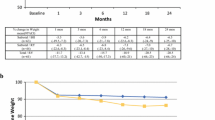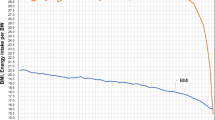Abstract
Objectives
Elderly gastric cancer patients undergoing radical gastrectomy are prone to experience unexpected weight loss. Preoperative weight risk prediction may be a promising way to prevent weight loss and improve prognosis. The objectives of this study were to explore the BMI trajectory of elderly gastric cancer patients one year after surgery, evaluate theirs the association with outcomes, and explore their related predictors, so as to provide evidence for weight management and prognosis improvement.
Methods
412 gastric cancer patients were included and recorded BMI at 6 time points. The trajectories of BMI were analyzed by growth mixture modeling, and the associations of BMI trajectories with outcomes as well as their predictors were investigated by regression models.
Results
We identified 3 classes of BMI trajectories: the “slow-decreasing BMI”, “rapid-decreasing BMI” and “maintaining BMI”. Compared with class1, patients in class 2 were more likely to have a higher frequency of readmission within 1-year(β = 0.59, 95%CI: 0.29, 0.89, P < 0.001) and a higher rate of mortality within 1-year(β = 24.74, 95%CI: 9.60, 63.74, P < 0.001) ; patients in class 3 were more likely to have a higher quality of life (β=-10.46, 95%CI: -17.70, -3.22, P = 0.005) and fewer readmission times within one year (β=-0.43, 95%CI: -0.77, -0.09, P = 0.015). Predictors of decreasing BMI trajectories were TNM stage, comorbidity, anxiety, family cohesion and social support(P < 0.05).
Conclusions
Our findings can provide a basis for screening high-risk elderly gastric cancer patients with poor prognosis, implementing risk stratification, formulating accurate weight management programs and improving prognosis.
Implications for Cancer Survivors
The results of our study can provide gastric cancer survivors with preoperative risk screening based on predictive factors so that nutritional support and weight management can be implemented in a timely manner to improve prognosis.

Similar content being viewed by others
Data availability
The datasets generated during and/or analysed during the current study are available from the corresponding author on reasonable request.
References
Libânio D, Rodrigues JR, Bento MJ, et al. Gastric cancer incidence and mortality trends 2007–2016 in three european countries [J]. Endoscopy. 2022;54(7):644–52. https://doi.org/10.1055/a-1673-1118.
Sung H, Ferlay J, Siegel RL, et al. Global cancer statistics 2020: GLOBOCAN estimates of incidence and mortality worldwide for 36 cancers in 185 countries [J]. CA Cancer J Clin. 2021;71(3):209–49. https://doi.org/10.3322/caac.21660.
Wong MCS, Huang J, Chan PSF, et al. Global incidence and mortality of gastric cancer, 1980–2018 [J]. JAMA Netw Open. 2021;4(7):e2118457. https://doi.org/10.1001/jamanetworkopen.2021.18457.
Van Der Veen A, Brenkman HJF, Seesing MFJ, et al. Laparoscopic Versus Open Gastrectomy for Gastric Cancer (LOGICA): a multicenter randomized clinical trial [J]. J Clin Oncol. 2021;39(9):978–89. https://doi.org/10.1200/jco.20.01540.
Liang H. [The Precised management of surgical treatment for gastric cancer: interpretation of the 5th edition of Japanese gastric cancer treatment guideline and the 15th edition of Japanese classification for gastric cancer] [J]. Zhonghua Zhong Liu Za Zhi, 2019;41(3):168–72. https://doi.org/10.3760/cma.j.issn.0253-3766.2019.03.002.
Wagner M, Probst P, Haselbeck-Köbler M, et al. The problem of appetite loss after major abdominal surgery: a systematic review [J]. Ann Surg. 2022;276(2):256–69. https://doi.org/10.1097/sla.0000000000005379.
Halpern AL, McCarter MD. Palliative management of gastric and esophageal cancer [J]. Surg Clin North Am. 2019;99(3):555–69. https://doi.org/10.1016/j.suc.2019.02.007.
Meng Q, Tan S, Jiang Y, et al. Post-discharge oral nutritional supplements with dietary advice in patients at nutritional risk after surgery for gastric cancer: a randomized clinical trial [J]. Clin Nutri (Edinburgh Scotland). 2021;40(1):40–6. https://doi.org/10.1016/j.clnu.2020.04.043.
Davis JL, Selby LV, Chou JF, et al. Patterns and predictors of weight loss after gastrectomy for cancer [J]. Ann Surg Oncol. 2016;23(5):1639–45. https://doi.org/10.1245/s10434-015-5065-3.
Kim KW, Lee K, Lee JB, et al. Preoperative nutritional risk index and postoperative one-year skeletal muscle loss can predict the prognosis of patients with gastric adenocarcinoma: a registry-based study [J]. BMC Cancer. 2021;21(1):157. https://doi.org/10.1186/s12885-021-07885-7.
Demark-Wahnefried W, Schmitz KH, Alfano CM, et al. Weight management and physical activity throughout the cancer care continuum [J]. CA Cancer J Clin. 2018;68(1):64–89. https://doi.org/10.3322/caac.21441.
Janssen I, Heymsfield SB, Allison DB, et al. Body mass index and waist circumference independently contribute to the prediction of nonabdominal, abdominal subcutaneous, and visceral fat [J]. Am J Clin Nutr. 2002;75(4):683–8. https://doi.org/10.1093/ajcn/75.4.683.
Lee HH, Park JM, Song KY, et al. Survival impact of postoperative body mass index in gastric cancer patients undergoing gastrectomy [J]. Eur J Cancer. 2016;52:129–37. https://doi.org/10.1016/j.ejca.2015.10.061.
Tokunaga M, Hiki N, Fukunaga T, et al. Better 5-year survival rate following curative gastrectomy in overweight patients [J]. Ann Surg Oncol. 2009;16(12):3245–51. https://doi.org/10.1245/s10434-009-0645-8.
Park JH, Kim E, Seol EM, et al. Prediction model for screening patients at risk of Malnutrition after gastric Cancer surgery [J]. Ann Surg Oncol. 2021;28(8):4471–81. https://doi.org/10.1245/s10434-020-09559-3.
Fujiya K, Kawamura T, Omae K, et al. Impact of malnutrition after gastrectomy for gastric cancer on long-term survival. [J]. Ann Surg Oncol. 2018;25(4):974–83. https://doi.org/10.1245/s10434-018-6342-8.
China WGOOL. Guidelines for prevention and control of overweight and obesity in chinese adults [J]. Acta Nutrimenta Sinica. 2004;26(1):1–4.
Yang M, Luo L, Jiang J. Development of the elderly disability assessment scale (II): the selection of items for the formal version [J]. Chin J Rehabil Med. 2014;29:212–7. https://doi.org/10.3969/j.issn.1001-1242.2014.03.004.
Meng Q, Luo J, Wan C et al. Development and evaluation on Chinese version of measurement instrument of quality of life for patients with stomach cancer: EORTC QLQ-STO22 [J]. J Kunming Med Univ. 2012;33(10):34–8.
Rubenstein LZ, Harker JO, Salvà A, et al. Screening for undernutrition in geriatric practice: developing the short-form mini-nutritional assessment (MNA-SF) [J]. J Gerontol A Biol Sci Med Sci. 2001;56(6):M366-72. https://doi.org/10.1093/gerona/56.6.m366.
Norton S, Cosco T, Doyle F, et al. The hospital anxiety and depression scale: a meta confirmatory factor analysis [J]. J Psychosom Res. 2013;74(1):74–81. https://doi.org/10.1016/j.jpsychores.2012.10.010.
Fei L, Shen Q, Zheng Y, et al. Preliminary evaluation of Chinese version of FACES II and FES: comparison of normal families and families of schizophrenic [J]. Chin Mental Health J. 1991;5(5):198–202.
Zhang M, Gong X, Li W, et al. The influence of original family cohesion and adaptability on the puerperant postpartum depression [J]. J Wenzhou Med Univ. 2021;51(04):323–6. https://doi.org/10.3969/j.issn.2095-9400.2021.04.014.
Thomas LH, McColle E, Priest J, et al. Newcastle satisfaction with nursing scales: an instrument for quality assessments of nursing care [J]. Qual Health Care. 1996;5(2):67–72. https://doi.org/10.1136/qshc.5.2.67.
Xiao S-Y. The theoretical basis and research application of social support rating scale [J]. J Clin Psychiatry. 1994;4(2):98–100.
Kim SY. Determining the number of latent classes in single- and multi-phase growth mixture models [J]. Struct Equ Model. 2014;21(2):263–79. https://doi.org/10.1080/10705511.2014.882690.
Mara CA, Carle AC. Understanding variation in longitudinal data using latent growth mixture modeling [J]. J Pediatr Psychol. 2021;46(2):179–88. https://doi.org/10.1093/jpepsy/jsab010.
Takata N, Kikuchi S, Kuroda S, et al. Effect of patient-participation continuous nutritional counseling in gastric cancer patients who underwent gastrectomy [J]. Ann Surg Oncol. 2023;30(2):1110–8. https://doi.org/10.1245/s10434-022-12572-3.
Lim HS, Lee B, Cho I, et al. Nutritional and clinical factors affecting Weight and Fat-Free Mass loss after gastrectomy in patients with gastric cancer [J]. Nutrients. 2020;12(7). https://doi.org/10.3390/nu12071905.
Numico G, Longo V, Courthod G, et al. Cancer survivorship: long-term side-effects of anticancer treatments of gastrointestinal cancer [J]. Curr Opin Oncol. 2015;27(4):351–7. https://doi.org/10.1097/cco.0000000000000203.
Avgerinos KI, Spyroun N, Mantzoros CS. Obesity and cancer risk: emerging biological mechanisms and perspectives [J]. Metabolism. 2019;92:121–35. https://doi.org/10.1016/j.metabol.2018.11.001.
Thrift AP, Wenker TN, El-Serag HB. Global burden of gastric cancer: epidemiological trends, risk factors, screening and prevention [J]. Nat Rev Clin Oncol. 2023. https://doi.org/10.1038/s41571-023-00747-0.
Matsui R, Inaki N, Tsuji T, et al. Preoperative high visceral fat increases severe complications but improves long-term prognosis after gastrectomy for patients with advanced gastric cancer: a propensity score matching analysis [J]. Nutrients. 2022;14(20). https://doi.org/10.3390/nu14204236.
Gonzalez MC, Pastore CA, Orlandi SP, et al. Obesity paradox in cancer: new insights provided by body composition [J]. Am J Clin Nutr. 2014;99(5):999–1005. https://doi.org/10.3945/ajcn.113.071399.
Simati S, Kokkinos A, Dalamaga M, et al. Obesity paradox: fact or fiction? [J]. Curr Obes Rep. 2023. https://doi.org/10.1007/s13679-023-00497-1.
Murphy WJ, Longo DL. The surprisingly positive association between obesity and cancer immunotherapy efficacy [J]. JAMA. 2019;321(13):1247–8. https://doi.org/10.1001/jama.2019.0463.
Choi YY, Kim H, Shin SJ, et al. Microsatellite instability and programmed cell death-ligand 1 expression in stage II/III gastric cancer: Post hoc analysis of the CLASSIC randomized controlled study [J]. Ann Surg. 2019;270(2):309–16. https://doi.org/10.1097/sla.0000000000002803.
Roh CK, Choi YY, Choi S, et al. Single patient classifier assay, microsatellite instability, and epstein-barr virus status predict clinical outcomes in stage II/III gastric cancer: results from CLASSIC trial [J]. Yonsei Med J. 2019;60(2):132–9. https://doi.org/10.3349/ymj.2019.60.2.132.
Elbaz-Greener G, Rozen G, Carasso S. The relationship between body mass index and In-hospital survival in patients admitted with acute heart failure [J]. Front Cardiovasc Med. 2022;9:855525. https://doi.org/10.3389/fcvm.2022.855525.
Lee HA, Park H. Comorbidity network analysis related to obesity in middle-aged and older adults: findings from korean population-based survey data [J]. Epidemiol Health. 2021;43:e2021018. https://doi.org/10.4178/epih.e2021018.
Panigrahi G. Ambs S. How comorbidities shape cancer biology and survival [J]. Trends Cancer 2021;7(6):488–95. https://doi.org/10.1016/j.trecan.2020.12.010.
Choi J, Kim S, Choi M, et al. Factors affecting the quality of life of gastric cancer survivors [J]. Support Care Cancer. 2022;30(4):3215–24. https://doi.org/10.1007/s00520-021-06683-y.
Jeong A, An JY. The moderating role of social support on depression and anxiety for gastric cancer patients and their family caregivers [J]. PLoS ONE. 2017;12(12):e0189808. https://doi.org/10.1371/journal.pone.0189808.
Kim GM, Kim SJ, Song SK, et al. Prevalence and prognostic implications of psychological distress in patients with gastric cancer [J]. BMC Cancer. 2017;20(1):283. https://doi.org/10.1186/s12885-017-3260-2.
Torres-Blasco N, Castro-Figueroa EM, Zamorec C, et al. Family functioning and psychosocial symptoms among latinx patients coping with advanced cancer [J]. Palliat Support Care. 2022;1–4. https://doi.org/10.1017/s1478951522001201.
Acknowledgements
We thank the support from the National Natural Science Foundation of China and Jiangsu Higher Education Institution Research Project Contract for this study.
Funding
This study was supported by two projects: project “The exploration of trajectories and intervention program of frailty for gastric cancer survivors based on the health ecology theory” supported by the National Natural Science Foundation of China (NSFC) (No.82073407) and the Basic Science (Natural Science) of Jiangsu Higher Education Institution Research Project Contract (Project No. 22KJB320013).
Author information
Authors and Affiliations
Contributions
All authors contributed to the study conception and design. Material preparation, data collection and analysis were performed by Yinning Guo, Yimeng Chen and Xueyi Miao. The first draft of the manuscript was written by Yinning Guo and Yimeng Chen and all authors commented on previous versions of the manuscript. All authors read and approved the final manuscript.
Corresponding authors
Ethics declarations
Competing interests
The authors declare no competing interests.
Additional information
Publisher’s Note
Springer Nature remains neutral with regard to jurisdictional claims in published maps and institutional affiliations.
Yinning Guo and Yimeng Chen contributed equally to this work and they are co-first authors.
Registration: ChiCTR2100052769
Supplementary information
Below is the link to the electronic supplementary material.
ESM 1
(DPCX 55.3 KB)
Rights and permissions
Springer Nature or its licensor (e.g. a society or other partner) holds exclusive rights to this article under a publishing agreement with the author(s) or other rightsholder(s); author self-archiving of the accepted manuscript version of this article is solely governed by the terms of such publishing agreement and applicable law.
About this article
Cite this article
Guo, Y., Chen, Y., Miao, X. et al. BMI trajectories, associations with outcomes and predictors in elderly gastric cancer patients undergoing radical gastrectomy: a prospective longitudinal observation study. J Cancer Surviv (2023). https://doi.org/10.1007/s11764-023-01480-4
Received:
Accepted:
Published:
DOI: https://doi.org/10.1007/s11764-023-01480-4




